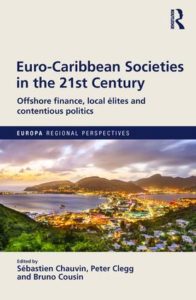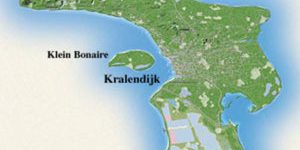Sébastien Chauvin, Peter Clegg & Bruno Cousin (Eds.) Euro-Caribbean Societies in the 21st Century – Offshore finance, local élites and contentious politics
No comments yet This edited collection examines the realities of the last remnants of the European colonial empires in the Caribbean, namely the British, Dutch and French overseas territories.
This edited collection examines the realities of the last remnants of the European colonial empires in the Caribbean, namely the British, Dutch and French overseas territories.
Euro-Caribbean Societies in the 21st Century – Offshore finance, local élites and contentious politics – Edited by Sébastien Chauvin, Peter Clegg, Bruno Cousin.
ISBN 9781857438697 (Hardback) – 9781351248877 (eBook) – Routledge, London, 2018
Order: https://www.amazon.com/Euro-Caribbean-Societies-21st-Century-Perspectives/dp/1857438698
With chapters by Matthew L. Bishop, J. A. Roy Bodden, Audrey Célestine, Peter Clegg, Gérard Collomb, Justin Daniel, Lammert de Jong, May Hen, Edenz Maurice, Guy Numa, Genève Phillip, Chelsea Schields, Ron van der Veer, Wouter Veenendaal and William Vlcek.
Table of Contents + Introduction
Although known and perhaps infamous for their role as high-end tourist destinations and financial centres, these small jurisdictions are complex and multifaceted places. While this volume considers their role as financial centres, it does so from alternative and original perspectives by examining how the sector shapes the internal dynamics of these Caribbean societies, and how it is itself shaped by global trends. A range of contributions is included that highlight other key issues. Political relations between the territories and their metropolitan centres and with the European Union are the focus of several chapters, highlighting the stresses and strains, and in many cases the unfulfilled expectations of devolved governance. Further chapters describe the economic instability and factors of political conflict faced by some of these societies and the available options to address them. Finally, several chapters reflect more specifically on the territories’ internal social and ethnic dynamics, and the hierarchies and inequalities that result. Bringing together a variety of different disciplinary perspectives, from political science to sociology, and from anthropology to geography, this book will be of great interest to any academic or student who wishes to see how an often overlooked part of the world is actually a key site of socio-economic transformation and a crucial nexus in global affairs.
Table of Contents
Introduction – Offshore Europe on the move – Sébastien Chauvin, Peter Clegg and Bruno Cousin
Part I: Institutional, Political and Regulatory Processes: The transformation of relations with the metropolitan states, the EU, and the international community
1 The British Overseas Territories in the Caribbean and their quest for further autonomy – Peter Clegg
2 Status Change in the Caribbean part of the Kingdom of the Netherlands: What for? – Lammert de Jong and Ron van der Veer
3 The French Caribbean between egalitarian aspirations and identity assertions: Towards a realisation of difference? – Justin Daniel
4 From Brussels with love: Shifting governance and the evolution of ‘Overseas Europe’ – Matthew Louis Bishop and Genève Phillip
5 Brexit and the Overseas Territories: Repercussions for the periphery – Peter Clegg
6 Global financial governance and the Euro-Caribbean overseas territories: First and second order effects for offshore finance – William Vlcek
Part II: Economic Transformations, Roles of the Local Elites and the Current Dynamics of Inequality
7 Colonial heritages and continuities in Guadeloupe and Martinique: An economic perspective – Guy Numa
8 A postcolonial economy? Protesters, lobbyists and small-business-owners in Martinique after 2009 – Audrey Célestine
9 French Guiana – A ‘Plural Society’ in a post-colonial context – Gérard Collomb and Edenz Maurice
10 Deconstructing development: immigration, society and economy in early 21st century Cayman – Roy Bodden
11 Sub-elites as fiduciary gatekeepers of global elites: A fiscal anthropology of the Cayman Islands as an offshore financial centre – May Hen
12 Integration with the Metropolis: The Dutch Caribbean ‘municipalities’ after 2010 – Wouter Veenendaal
13 Intimacy and integration: The ambivalent achievement of marriage equality in the Dutch Caribbean, 2007-12 – Chelsea Schields
Introduction
For the majority of Europeans, as for the rest of the world, the British, Dutch and French overseas territories (OTs) are part of a fragmentary and blindspotted reality. In addition to making the news when hit by a particularly devastating natural disaster, they are often reduced to exotic holiday destinations or avenues for undermining global financial standards and the efforts of sovereign states in tax collection and resource redistribution. Following these two alternative perspectives, they are thus mainly mentioned by gossip columnists tracking celebrities during their winter holidays or when investigative journalists report about finance-related leaks and scandals.
Nevertheless, and despite the substantial progress achieved over the past few years with the macroeconomic analysis of offshoring, the magnitude of the role of these tax havens in the global economic system remains largely underestimated or hidden to the general public. While explaining the causes of the financial crisis of 2007–2008 and more specifically the structuration of collateralized debt obligations (CDOs), neither the director of Inside Job (2010) nor Ryan Gosling boldly illustrating securitization with an unstable pile of dominoes in The Big Short (2015) deemed it relevant to mention that most CDOs had been issued by special purpose entities based in the Cayman Islands. Moreover, as imagined paradise islands and offshore financial centres, the Euro-Caribbean territories are generally seen as quite immune to the effects of global political and economic turmoil, as if the main historical trends and events could only marginally affect them. This book challenges such preconceptions with the methods and analytical tools of the social sciences by investigating the different aspects of the transatlantic relationship between these territories and their respective metropolitan centres, as well as the ways in which the global and regional dynamics of power and financial and migratory flows contribute to the shaping of local societies and inequalities.
Despite the fact that much of the region is characterized by significant development challenges, Europe’s OTs in the Caribbean, with relatively high per capita gross domestic products (GDPs) and more stable political and social systems, appear to be doing considerably better than independent countries. However, reality is more complex. There are stark inequalities within the territories, and between the territories and their respective sovereign countries – sometimes they are richer, but often they are significantly poorer – and this has a considerable effect on their societies more generally. Due to their non-sovereignty, the territories are shaped and defined by an array of external forces. The book thus considers the situation whereby the British, Dutch and French West Indies are among the last examples of empire that are still institutionally dependent, in one way or another, on their metropoles. They inherited a (post-)colonial and racialized social order that is typically studied by anthropologists and sociologists at the local level, while their key role in structuring financial and human flows is addressed by political scientists, economists and geographers on a global and/or national scale.
These methodologies are important and inspire several chapters, but the volume also incorporates additional original approaches. For instance, the book considers the agency of local actors and the ways in which they participate in global dynamics; it explores how global influences help to structure power relations and interactions between natives, immigrants and non-residents; and it gauges how a specific hierarchy of citizenship statuses or an accurately tailored institutional semi-autonomy can be mobilized as a collective and individual resource. Thus, if several chapters are interventions in specific disciplinary and national sub-fields (and debates), many others are part of a project of scientific decompartmentalization reaching across the usual boundaries of disciplines.
In addition, the book addresses the causes and effects of the major institutional changes that have taken place recently, some of which have redefined the status of the territories within their respective national states and, sometimes, vis-à-vis the European Union (EU). It also analyses the local effects of the global economic crisis – both direct, from its impact on local economies to the contentious politics it created, and indirect, such as how reinvigorated international pressure to ensure financial transparency has affected the activity of offshore centres. These issues are very important in their own right, but the book goes further by drawing out the deeper impacts of these developments, in considering how they affect issues such as inequality, class structure and inter-ethnic relations that define the specificity of each island territory.[1]
The first part of the book details the recent changes that have been made to the political arrangements in place between the territories, their respective metropolitan powers, and the EU. It also evaluates how the international community has impacted on the territories, in particular through its attempts to better regulate offshore finance, which are having consequences for the territories’ (post-)colonial relations and their position within the current world-system. The opening chapters consider the governance arrangements that are in place for the British, Dutch and French OTs and how they have slowly altered over time. In Chapter 1, Peter Clegg analyses the position of the British OTs, a legacy of an almost complete process of decolonization which took place between the early 1960s and early 1980s. Five territories remain (six if one includes Bermuda in the West Atlantic), and they have traditionally claimed more autonomy than those overseen by France and the Netherlands. This is in part due to a looser approach taken by successive British governments, and because many of the territories are economically self-sufficient with lucrative offshore financial industries. Over the last 20 years there has been moderate political reform, but Clegg doubts that full decolonization will take place in the foreseeable future. One reason for this is the British government’s strong support for the OTs’ offshore sector.
The subsequent two chapters by Lammert de Jong and Ron van der Veer, and Justin Daniel focus on the Dutch and French territories, respectively. Both sets of territories have recently witnessed more substantial changes than those overseen by Britain. For the Dutch territories, a key change took place on 10 October 2010 (known as 10/10/10) with the Netherlands Antilles disappearing as a country. In its place, various autonomous countries within the Kingdom of the Netherlands and special municipalities of the Netherlands were created. This resulted in a kind of jigsaw puzzle, not only in geographic terms, as the closest islands do not necessarily share the same administrative status, but also for the people themselves. De Jong and van der Veer examine whether 10/10/10 should be judged as a continuation of a form of colonization, or whether it can be framed in a post-post-colonial vocabulary. It is clear that with disagreements over the degree of supervision by the Kingdom (in short, by the Netherlands) and concerns over freedom of movement across the Kingdom, a sense of colonialism still appears to be deeply embedded.
For France too, combining post-colonial consolidation in the region with the uniformization of the administrative state has been a challenge, as Justin Daniel explains. He considers the administrative and discursive categories through which the metropole constructs its relationships with the various OTs, regulated by Article 73 of the French Constitution and the Treaty on the Functioning of the EU. His chapter focuses on France’s declared will to proceed with the transfiguration of a subordinate relationship into a partnership. Policy discourses went from the negative image of remote, costly territories to the promotion of the ‘competitiveness and sustainable development potential’ of OTs. Furthermore, the advent of a neoliberal policy framework has led to the metropole encouraging horizontal regional development and exchanges within the Caribbean more than before. Combined with the dynamics of decentralization and Europeanization of public policies, there is now a greater emphasis on the territorialization of public action and participative democracy.
Chapter 4 by Matthew Louis Bishop and Genève Phillip expands the book’s focus on the EU and considers how developments initiated by the metropoles now often overlap with a process of Europeanization. New administrative categories and financial streams have come from Brussels towards ‘Overseas Europe’, in particular with a development purpose. The Overseas Countries and Territories Association directly engages the European Commission and European Parliament on behalf of 22 OCTs. However, these flows are being challenged by EU enlargement, since the inclusion of poorer Eastern European countries has brought many Caribbean territories above the threshold of 75 per cent of the average European per capita GDP which determines access to structural help. Another feature of the Europeanization process has been the importance of securing and maintaining EU citizenship and the related freedom to travel, work and live in the EU. A further issue is related to trade policies. Since the 1990s independent countries belonging to the African, Caribbean and Pacific (ACP) group have seen their relations with the EU become ever more reliant on neoliberal norms of free trade and market fundamentalism. However, during the same period, and at complete variance with that approach, the EU has accepted greater protectionism in its dealings with the non-sovereign territories (such as tolerance for the octroi de mer import duty). As Bishop and Phillip argue, this has resulted in ‘jarring acts of cognitive dissonance’ with the EU seemingly admitting that successful development rests both on post-colonial protectionism and market-mediated neoliberalism.
The next chapter addresses the process of Europeanization from a different view – that of Britain’s decision in June 2016 to leave the EU (known as Brexit). In his second contribution, Clegg evaluates the likely consequences of the Brexit decision on the OTs. The latter were in favour of ‘remain’, but they had no official voice as their citizens could not vote in the referendum. The territories wish to maintain a link with the EU, as they receive a range of bene- fits, such as development assistance and free access to the continent for their goods, services and investments. They also wish to preserve the advantages they enjoy in the areas of environmental protection, climate change mitigation, and sustainable energy. As the United Kingdom (UK) exits the EU, its OTs will almost certainly lose some of these advantages, as well as free mobility of its citizens within the Union. The final outcome of Brexit and its impact on the OTs are as yet unknown, but there are serious concerns that the latter will lose out and any losses incurred will not be covered by Britain. Clegg analyses these issues and provides an account of the initial talks between the OTs and Britain on a possible post-Brexit future.
The focus broadens again for the final chapter of Part I. William Vlcek analyses the global efforts, via the Organisation for Economic Co-operation and Development and other actors, to constrain the impact of offshore financial centres of the Caribbean on larger states’ ability to collect tax revenues. Particular consideration is given to developments taking place since the 2008 financial crisis, and to the ‘second-order’ effects of international regulation on the jurisdictions of the Caribbean, for example the decision by a number of international banks in Hong Kong to refuse to provide accounts to corporations registered in the British Virgin Islands owing to the risk of money laundering. More broadly, the chapter describes the efforts to address non-taxation in the digital economy and the use of corporate entities registered in offshore locations in this multinational corporate structure. The Euro-Caribbean space is and remains not simply a relationship of the post-colonial territories to Europe, but is also a key site for the transactions and transfers that comprise global networks of capital.
The second part of the book provides case studies of how these post-colonial and global reconfigurations are affecting the internal economic, class and ethno-racial relations of the OTs. This is achieved through considering several social groups enjoying various levels of privilege, but who are now being faced by greater competing and opposing interests. Nowhere is the connection between the ruling class of the colonial period and the propertied class of today more manifest than in Guadeloupe and Martinique, where the békés (the white descendants of the first European planters) own quasi-economic monopolies in sectors such as retail and petrol stations. In consequence, as Guy Numa explains in Chapter 7, the civil society-backed protests that took place in the two islands in 2009 had a common theme: the struggle against the high cost of living. Over a period of 44 days protesters criticized price levels and demanded higher wages. Numa considers the economic ramifications of the protests, highlighting the structural deficiencies of the local economies. In particular, he identifies that the French government does not preserve freedom of commerce and business in the islands, and fails to protect Caribbean consumers. Public authorities accept horizontal and vertical monopolies in key sectors and do not enforce anti-trust legislation.
Chapter 8 by Audrey Célestine delves deeper into the unrest in Martinique and particularly the mobilization of business owners’ federations and interest groups to define their role in the economy in the aftermath of the 2009 movement. By framing their revolt in terms of a fight against ‘pwofitasion’ (profiteering), social movement leaders successfully designated the békés as a problematic social and racial group within the Martinique ownership structure. In response, business élites tried to create a new narrative based on Martinican ‘entrepreneurship’, via promotional campaigns both locally and in Metropolitan France. In addition to economic arguments, the racial frame was therefore an unavoidable dimension of the 2009 protests: race and class have been so intertwined in the history of Martinique that the former often stands as a short cut for the latter, even though this can occasionally draw accusations of hate speech. Small business owners on the island occupied a somewhat intermediary position in this highly politicized representation of society, a position that both groups in conflict have sought to co-opt.
Although it is located much further south on the continent, French Guiana shares many of the challenges facing the French Caribbean islands. However, as Gérard Collomb and Edenz Maurice illustrate in Chapter 9, the remarkable (and increasing) cultural diversity of the Guianese population, resulting in the expression of complex ethnic claims, has contributed to the specificity of the territory’s nation-building process. The authors assess the role of teachers in French Guiana, who played an important political part from the late 1950s onwards, in redefining the contours of Guianese identity and achieving a symbolic transition from a colonial European society to a post-colonial American society. In so doing, they placed at the core of Guianese nationbuilding the process of Creolization, which had allowed French Guiana to integrate the successive waves of migrations experienced since the second half of the 19th century. However, this lone identity around being Creole partially replicated the French modernist model of integration. Ironically, by the 1970s new and more substantial migrations were then accused of being part of a Metropolitan plot to alter the structure of the Guianese population. Today, these social relations are being challenged by formerly marginalized populations, chiefly Amerindians and Businenge, whose symbolic and political weight is increasing. More importantly, the process of Creolization itself has reached its limits, despite attempts by the Creole élites to bring other ethnicities into the fold. It no longer represents cohesion and integration, as the numerous newly arrived populations now refuse to identify with it. As the authors suggest, beyond its political union with France, French Guiana must now try to imagine a public space for the articulation of all groups.
Chapter 10 by J. A. Roy Bodden considers the Cayman Islands and how its internal social structure has been profoundly reshaped by globalization and transnational flows over recent decades. Cayman is a ‘totally imported society’ argues the author, in the sense that there was no indigenous population before the arrival of the first Europeans. Economic activity remained low until the 1950s, when Caymanian sailors hired by US companies began to send remittances that helped to develop the country. These developments prompted wealthy North American investors to take a keen interest in what they considered a tropical paradise. It also spawned an influx of British expatriate attorneys, bankers and speculators, and then large numbers of cheap skilled and semi-skilled labourers to service the booming tourism and construction industries. As a consequence, the number of people living in the Cayman Islands quadrupled between 1960 and the end of the 1990s. Bodden contends that as a result of failed immigration and economic planning policies, the Cayman Islands is on the cusp of upheaval. He argues that the importation of cheap labour continues unabated and ‘voluntary colonialism’ has spawned an identity crisis among established Caymanians. This situation is further compounded by wage stagnation and income inequality which place established Caymanians and low-income immigrant labourers at a disadvantage vis-à-vis the white-collar expatriates. In reality, these expatriates are often considered ‘paper Caymanians’ after acquiring ‘belonger’ status, bestowing among other privileges the right to vote and fuller access to the labour market. Conversely, expatriates decry what they see as the ‘entitlement culture’ of the native population. Such a toxic mixture has spawned an unhealthy duality (‘us’ Caymanians against ‘them‘ expatriates), which, with no prospects for a rapprochement, leaves Cayman as a society at risk.
The focus on the Cayman Islands continues in Chapter 11 as May Hen delves deeper into the relationship between Caymanians and expatriates in relation to the territory’s offshore financial industry. Little is understood about their complex sociopolitical relations both locally and globally. The chapter thus looks at the fiscal anthropology and sociology of offshore finance by studying the technocratic professionals that the author defines as sub-élites. These are the organisers, experts and mediators who serve to bridge the gap between the local economy and the international interests of global élites, while guarding the barriers to entry into the financial industry. Hen considers how these sub- élites have changed a small maritime and plantation economy into a powerful offshore financial hub. As the chapter shows, class and race are integral concerns: sub-élites are imagined to be white expatriates from the Global North, thereby overshadowing the role of indigenous Caymanians and nationals from Latin America. Expat employment is constructed as a temporary situation, but it is more permanenti n reality. The official policy of hiring locals is often not enforced, particularly as permit renewal fees represent a significant source of income to the government. Moreover, expats reinforce their position by the need for highly specialized professional qualifications (many of which can only be gained abroad). The purpose of the chapter is to understand how indigenous and expatriate populations collaborate with each other, often with some hostility and unease, to communicate their professional expectations and consolidate the competitive position of their territory as an international financial centre.
The last two chapters deal with the Dutch territories. Chapter 12 by Wouter Veenendaal examines public opinion in the three islands that became special municipalities of the Netherlands (Bonaire, St Eustatius and Saba). While they have a total population of only 20,000, the integration of these islands not only represents a significant change in Dutch post-war decolonization policies, but arguably also constitutes the most dramatic status change in the non-sovereign Caribbean in recent decades. Seven years on, dissatisfaction with the new constitutional status is the predominant sentiment among the island populations, as many people resist the perceived ‘recolonization’ of their islands. In an attempt to (re)gain greater political autonomy, both Bonaire and St Eustatius have organized new status referendums, which so far have not resulted in any changes. In October 2015 the Dutch government presented its own evaluation of the constitutional reforms and concluded that the overall outcome has been disappointing. Veenendaal examines the effects of the 2010 reforms on the attitudes and opinions of citizens, politicians and bureaucrats in the three municipalities. It is apparent that divisions within the populations and political élites as to the outcome of the status change are refracted through the broader political climate of the islands, which is characterized by strongly personalized forms of competition, a polarized and hostile relationship between political parties, and a legacy of patron-client linkages. These divisions create difficulty in dealing with The Hague as one voice, and further exacerbate dissatisfaction in the islands.
Finally, Chelsea Schields deals with one emblematic aspect of this discontent – the introduction of marriage equality in the municipalities. Two years after 10.10.10, the Parliament in The Hague applied Dutch laws on same-sex marriage, abortion and euthanasia to the BES. Situating sex and gender at the centre of studies of non-sovereignty, Schields focuses on marriage. In 2012 Saba became the site of the first same-sex marriage officially performed in the Caribbean. Heralding the occasion, the international media linked marriage equality on Saba to the island’s new political status as a Dutch municipality. However, the imposition of marriage law and the broader terms of integration in which sexual politics were embedded polarized politicians, residents and activists on both sides of the Atlantic. Schields examines this protracted debate through press and parliamentary discussions. In particular, she considers the range of alliances mobilized as a result of the marriage equality debate. On the one hand, island leaders who criticized the law as an infraction of the islands’ right to self-determination found unlikely allies in the Dutch Christian right, who leveraged their rejection of gay rights as a defence against neocolonialism. On the other hand, a coalition of Dutch populist, leftist and liberal parties converged in their support for marriage equality. Yet, as politicians improvized the terms of integration to include sexual liberties, they circumvented other rights such as equal social welfare spending. Furthermore, by grounding the integration process in The Hague, this coalition marginalized both a home-grown Antillean gay rights movement and island leadership. The result of these cleavages, as the chapter shows, was to render incompatible the goals of sexual progressivism and anti-imperialism. Many noted the irony that the former colonial power was now, in the name of sexual progress, proposing to educate former colonies about the protection of human rights, while during the colonial period notions of hyper-sexuality functioned to justify European coercion based on racial difference. Today, it is the region’s perceived conservatism that rationalizes Dutch activism in the Antilles.
Thus, it is the intention of the volume to go beyond the sometimes unflattering headlines and to critique the multidimensional relationships and political, economic and social trends that exist within ‘offshore Europe’. As the Introduction has shown and the subsequent chapters will illustrate, there are three key sets of often interlinked influences – the international, particularly in relation to offshore financial regulation; the metropole, with the still influential role of Britain, France and the Netherlands shaping and often restraining the actions and aspirations of the territories; and the internal social, ethnic and racial dynamics that can offer both opportunities and risks. The perceived relative affluence and stability of ‘offshore Europe’ shrouds a more nuanced picture of political dissonance, economic vulnerability and inequality, and social conflict, all of which must be addressed in order to fully understand the current embeddedness of Caribbean societies in the world economy.
The Introduction was going to end with the previous paragraph, but as the final words were being written (in September 2017) Hurricane Irma swept across the Euro-Caribbean islands badly affecting several of the territories, in particular Anguilla, the British Virgin Islands, St-Barthélemy and St-Martin/Sint Maarten. Less than two weeks later, Guadeloupe was hit by Maria, another category 5 hurricane. Irma caused the death of 20 people and perhaps US $6–7 billion of damage in these small territories alone. The impact was so great that the British, Dutch and French governments had to intervene. There were concerns that all three could have done more, but particular criticism was levelled at the British response. Comments such as ‘pathetic’, ‘sorely lacking’, and ‘too slow’ were made; the latter coming from Members of Parliament representing the governing Conservative Party. Humanitarian aid was provided by the British, but there was a sense that the more devolved relationship between the UK and its territories were not helpful in managing such a crisis. The comment by Alan Duncan, Minister of State at the Foreign and Commonwealth Office, that ‘We do not directly govern the overseas territories; they govern themselves’ illustrated the point, despite the fact that Britain has clear commitments to assist territories when they are facing a disaster. Furthermore, based on Britain’s immediate response there are concerns about its support for the longer-term reconstruction effort. Doubts are being raised whether Britain has the sustained commitment and resources at its disposal (within the shadow of Brexit), and whether the territories can make their case for funds in an effective way. There have already been suggestions that funds for reconstruction should be provided only if the territories move away from their offshore status. The response of all three metropolitan powers to Irma has been brought into sharp relief; so too has the way in which their respective governance arrangements have played their part. Concerning Britain and its overseas islands, it is not infeasible that a more fundamental review of political and economic ties will be undertaken in the coming months and years.
Note
[1] This book originated from a large symposium during the 22nd International Conference of Europeanists held in Paris, France, in July 2015. We would like to thank all the participants and discussants that made the Paris symposium a fruitful moment of academic exchange, including Jennifer Fredette, Ronen Palan, Aurélie Roger and Patrick Weil.
You May Also Like
Comments
Leave a Reply








